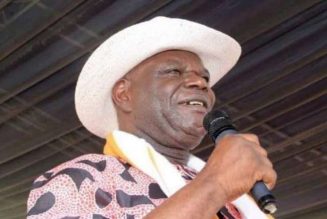Columnists
Assessing President Ruto after first year
Friday September 15 2023

President William Ruto addresses wananchi moments after opening UDA regional office in Nyeri town on September 9, 2023. PHOTO | JOSEPH KANYI | NMG
The Kenya Kwanza administration has been in power for one full year. Where is our economy headed?
If you insist on assessing the administration on economic performance by listing specific achievements and on the basis of macro-economic data — GDP growth, inflation, interest rates, the exchange rate, the budget deficit, current account deficit — your analysis will not give you fresh insight.
You will find yourself regurgitating drab data that is already in the public domain.
You will end up with a boring exercise of listing promises that were made during the elections and which have yet to be fulfilled.
I choose to assess the administration by answering simple questions and discussing a few broad trends and straws in the wind about events happening quietly in the country with major consequences for the fortunes of the economy, but which do not end up in official data.
For instance, what can one say about the trends in relations between the State and business lobbies? Trends show that relations between the State and business, especially the manufacturing sector, are on a downturn.
Sentiment and confidence among the players in the material economy are a big factor in the economy.
Indeed, advocacy by strong business associations is how we have managed to sustain a functioning market economy.
Read: President Ruto’s first budget signals deep pain for taxpayers
These bodies and associations have historically played a key role in pushing for accountable and market-friendly policies.
While the stories are only told in whispers and even though the evidence may be anecdotal, the allegations about shenanigans that went on behind the scenes during the preparation and crafting of this year’s Finance Bill are simply frightening.
Low-level technocrats and economists who were involved in drafting this important Act tell long stories of political interference in their work.
I know manufacturers who are thinking about closing shop because provisions of the Act have completely wiped out competitive advantage.
How I long for the days when we had strong and permanent institutions for regular dialogue between the government and the material economy such as the entity that was known as Joint Industrial Consultative Council.
It acted as a clearing house for grievances of the private sector. Clearly, something has snapped up in terms of relations between the State and the material economy.
Yet another straw in the wind is a strong and widespread sentiment among Kenyan Asian businesspeople about what they perceive as a recent upsurge in anti-Asian sentiment among key members of the Kenya Kwanza administration.
Again, one can dismiss this phenomenon as a moot point. But, historically, Kenya-Asian capital has been a big factor in our material economy.
The wave of the persecution sentiment is fuelled by incidents such an occasion where a Cabinet Secretary is reported to have publicly dismissed the Kenya Association of Manufacturers as fighting only for the interests of members of the Asian community (46th tribe).
Race, colour, tribe
The rhetoric from our leaders should be supporting the private sector regardless of the race, colour and tribe of the entrepreneurs.
Another telling sign of the economic times we live in is a recent upsurge in the perennial struggle behind doors between nouveau riche and powerful importers and those representing the nation’s productive capital.
The other day, a reader sent me import documents showing how a Dubai-based company had exported thousands of tonnes of Brazilian Sugar into Kenya within a short period.
The reader suggested that I should interpret the recent escalation in the controversy over revival of Mumias Sugar Company in the context of the advent of this new crop of well-connected importers and their allies in Dubai.
In this struggle, alliances are not consistent. The political lines are also fluid.
Read: Bumpy economic ride for William Ruto’s first 100 days
Kenya will only start making a break when we have built a strong coalition between the government and the private sector with the capacity and capability to insist on efficient deeper local industrialisation versus the importers.
The writer is a former managing director of The East African.









